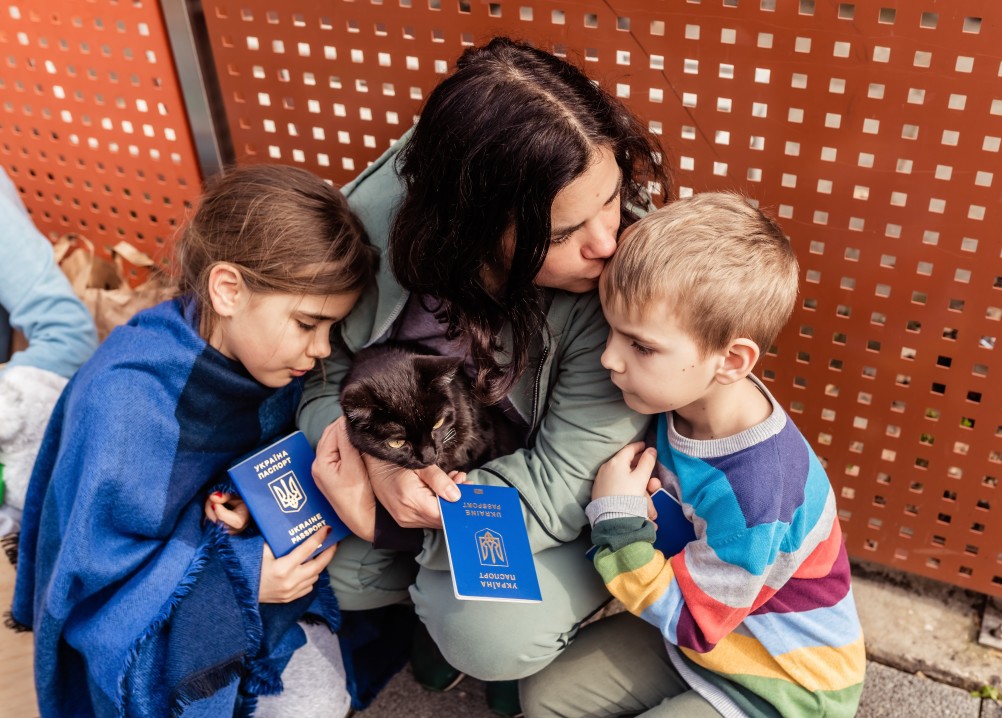Many of this war’s asylum seekers are bringing their pets with them.
In the last few weeks, millions of Ukrainians have packed up their most precious possession and fled the war Russia has unleashed on their country. Amongst those prized possessions are a surprisingly large number of cats, dogs, birds and other pets. Surprising, because this is actually a pretty unusual situation. Throughout human history millions and millions of people have left their home out of fear for their safety, but very few of them have travelled with furry friends in tow.
There are a few reasons for this. The first is that other countries aren’t generally keen on letting foreign animals cross their borders willy-nilly, because of concerns about them carrying diseases. The EU has decided to relax a lot of its animal-import rules for Ukrainian pets, but that’s only been the case for this specific place and this specific crisis.
On top of that, the journey of the average Ukrainian refugee is much more conducive to bringing a pet along than that of many other asylum seekers. Ukraine borders the EU, meaning there’s just usually just one custom check to get through. While Ukraine is not a rich country, an average citizen has more money than, say, the average Afghan or Syrian. That means less concern about being able to afford any pet-related expenses and the increased likelihood of travelling by a mode of transport - like a car or train - that it’s relatively easy to put a dog or cat crate in. In a similar vein, once they arrive in the EU Ukrainian will automatically be allowed to work (this is not normally the case for refugees), meaning they may have fewer financial concerns about how to support their fluffy dependents.
But another reason we haven’t seen as many refugee pets before may be because there's been shifts in the way people feel about pets. Pets are a type of property, like laptops or cars. That comes with certain connotations - that their primary reason for existing is to meet some need of their owner, that they are replaceable, that they are nothing like as important as human beings. But these days, many people don't see pets that way. They think of them as ‘little people’, who should enjoy many of the same rights and protections as humans do. Including, of course, the right to live safely and happily away from war. This view is a pretty modern phenomenon. During the Second World War, Brits euthanized their pets en masse so they didn’t have to waste food on them. These days, 40 percent of British pet owners say they would risk their life ‘without hesitation’ to save their furbaby.
European countries in general are particularly likely to regard animals as family members. That may explain why the EU was so willing to relax its rules on Ukrainian animals coming in, and why that decision doesn't seem to have generated much political pushback from Europeans. It may also explain why so many Ukrainian pet owners, four out of five of whom see their animals as family, have fled with Fido and Fluffy in tow. After all, many people are willing to sacrifice a great deal of time, effort and money if it will keep their family safe.
But some people worry that societies having too much concern for animals could have negative repercussions for vulnerable humans. In August 2021, after America abruptly withdrew from Afghanistan, the country quickly fell to the Taliban. Indeed, it fell so quickly that many locals who had tried to flee the country were unable to do so, including many who had worked for the Western armed forces and were therefore in particular danger. Many people in both Afghanistan and the West felt that these foreign governments had a particular responsibility to help get their former employees out. So when it came to light that the UK government had used one of their limited evacuation missions to fly out 94 rescue dogs and 68 cats, many people were angry about their prioritisation of animals over humans.
Read our explainer on: pets as property

